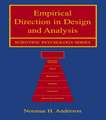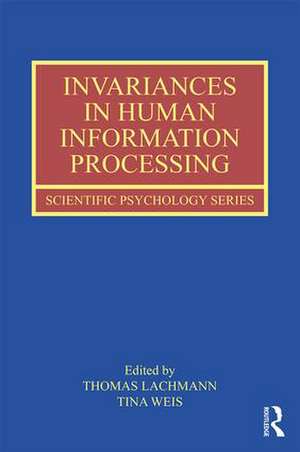Invariances in Human Information Processing: Scientific Psychology Series
Editat de Thomas Lachmann, Tina Weisen Limba Engleză Hardback – 9 mar 2018
| Toate formatele și edițiile | Preț | Express |
|---|---|---|
| Paperback (1) | 388.64 lei 6-8 săpt. | |
| Taylor & Francis – 30 sep 2020 | 388.64 lei 6-8 săpt. | |
| Hardback (1) | 766.33 lei 6-8 săpt. | |
| Taylor & Francis – 9 mar 2018 | 766.33 lei 6-8 săpt. |
Din seria Scientific Psychology Series
- 19%
 Preț: 426.84 lei
Preț: 426.84 lei -
 Preț: 314.77 lei
Preț: 314.77 lei -
 Preț: 110.23 lei
Preț: 110.23 lei -
 Preț: 478.71 lei
Preț: 478.71 lei - 27%
 Preț: 501.45 lei
Preț: 501.45 lei -
 Preț: 499.50 lei
Preț: 499.50 lei - 24%
 Preț: 320.80 lei
Preț: 320.80 lei -
 Preț: 493.73 lei
Preț: 493.73 lei -
 Preț: 489.87 lei
Preț: 489.87 lei -
 Preț: 491.17 lei
Preț: 491.17 lei -
 Preț: 492.20 lei
Preț: 492.20 lei -
 Preț: 482.74 lei
Preț: 482.74 lei -
 Preț: 228.77 lei
Preț: 228.77 lei - 28%
 Preț: 821.14 lei
Preț: 821.14 lei -
 Preț: 436.14 lei
Preț: 436.14 lei -
 Preț: 449.41 lei
Preț: 449.41 lei - 16%
 Preț: 325.34 lei
Preț: 325.34 lei - 16%
 Preț: 325.34 lei
Preț: 325.34 lei -
 Preț: 310.65 lei
Preț: 310.65 lei -
 Preț: 388.64 lei
Preț: 388.64 lei -
 Preț: 440.77 lei
Preț: 440.77 lei - 18%
 Preț: 788.94 lei
Preț: 788.94 lei -
 Preț: 127.59 lei
Preț: 127.59 lei - 28%
 Preț: 848.98 lei
Preț: 848.98 lei
Preț: 766.33 lei
Preț vechi: 1104.04 lei
-31% Nou
Puncte Express: 1149
Preț estimativ în valută:
146.65€ • 159.25$ • 123.19£
146.65€ • 159.25$ • 123.19£
Carte tipărită la comandă
Livrare economică 22 aprilie-06 mai
Preluare comenzi: 021 569.72.76
Specificații
ISBN-13: 9781138048904
ISBN-10: 1138048909
Pagini: 320
Ilustrații: 63 Line drawings, black and white; 7 Halftones, black and white; 11 Tables, black and white; 70 Illustrations, black and white
Dimensiuni: 152 x 229 x 23 mm
Greutate: 0.57 kg
Ediția:1
Editura: Taylor & Francis
Colecția Routledge
Seria Scientific Psychology Series
Locul publicării:Oxford, United Kingdom
ISBN-10: 1138048909
Pagini: 320
Ilustrații: 63 Line drawings, black and white; 7 Halftones, black and white; 11 Tables, black and white; 70 Illustrations, black and white
Dimensiuni: 152 x 229 x 23 mm
Greutate: 0.57 kg
Ediția:1
Editura: Taylor & Francis
Colecția Routledge
Seria Scientific Psychology Series
Locul publicării:Oxford, United Kingdom
Public țintă
PostgraduateCuprins
Part I Micro-stages in information processing: Identification of processing universals
Part II Meso-stages in information processing: Complex processing architectures
- Deciphering the time code of the brain: From psychophysical invariants to universals of neural organizationHans-Georg Geissler
- Dynamical constants and time universals: Relating and resolving two theories of cognitive microstructureMark A. Elliott and Naomi du Bois
- Measuring the processing epoch for decision processes: A paper in honour of Hans-Georg GeisslerStephen Link
- The concepts of perceived magnitude and dynamic range: What they reveal about the nature of sensory systems
Part II Meso-stages in information processing: Complex processing architectures
- Some constraints on reaction-time distributions for sequential processes = Saul Sternberg
- A theoretical study of process dependence for standard two-process serial models and standard two-process parallel modelsRu Zhang, Yanjun Liu, and James T. Townsend
- A brief overview of computational models of spatial, temporal, and feature visual attentionGeorge Sperling
- Perceptual organization and visual target selectionCees van Leeuwen, Tina Weis, and Thomas Lachmann
- Functional and structural MRI studies of multisensory integration underlying self-motion perceptionMark W. Greenlee and Sebastian M. Frank
Part III Macro-stages of information processing: Transitions in development and learning - Auditory attention in children and adults: A psychophysiological approachNicole Wetzel and Erich Schroger¨
- Reading Haiku: What eye movements reveal about the construction of literary meaning – A pilot studyThomas Geyer, Franziska Gunther, Jim Kacian, Hermann J. M¨ uller and¨ Stella Pierides
- Retrieval processes in person memory: Discrete levels of search timePeter Petzold and Brigitte Edeler
Part IV Epilog - Leipzig-Berlin and back: Science put in a life-story
Descriere
Invariances in Human Information Processing examines and identifies processing universals and how they are implemented in elementary judgmental processes. This edited collection offers evidence that these universals can be extracted and identified from observing law-like principles in perception, cognition, and action. Addressing memory operations, development, and conceptual learning, this book considers basic and complex meso- and makro-stages of information processing.
